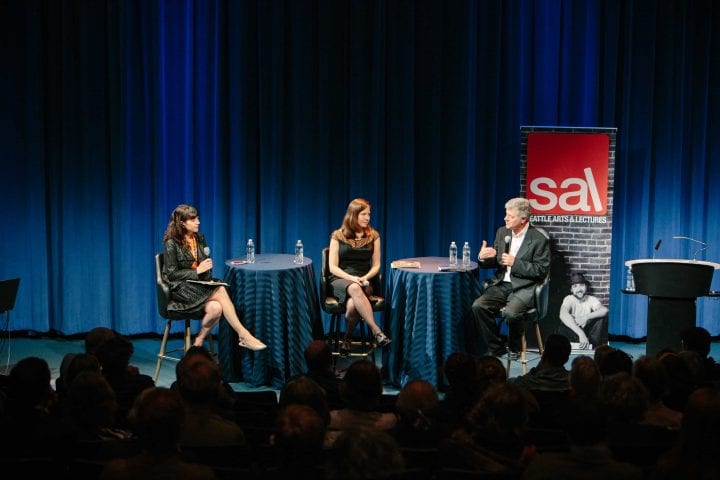
Introductions: Mary Syzbist & Robert Wrigley
November 2, 2015
On September 29 at McCaw Hall, SAL Associate Director Rebecca Hoogs introduced and moderated a conversation between Mary Syzbist and Robert Wrigley to open SAL’s 2015/16 Poetry Series.
It is an honor to shine tonight’s spotlight on two of the best poets writing today: Mary Szybist and Robert Wrigley. Portland poet Mary Szybist is the author of two books of poetry, the most recent of which, Incarnadine, won the 2013 National Book Award for Poetry. Idaho poet Robert Wrigley is the author of 9 books of poetry, including the most recent, Anatomy of Melancholy. For his prodigious career as a poet, he has garnered the prestitious Kingsley Tufts award, among others.
Mary’s work is often ekphrastic, inspired by the visual. It is quiet, quietly humorous, quietly devastating. The National Book Award Committee praised the most recent book, saying “In vulnerable lyrics, surprising concrete poems, and other forms, and with extraordinary sympathy and a light touch of humor, Szybist probes the nuances of love, loss, and the struggle for religious faith in a world that seems to argue against it. This is a religious book for nonbelievers, or a book of necessary doubts for the faithful.”
Robert’s work is a little louder, a little rangier; his language beats the anglo-saxon drum with old English words, like “stob” and “kerf,” that I was happy to have to look up. The Shenandoah Literary Review noted that his poems “vaccilate between plainspoken observations and highly lyrical, sonically charged narratives.” And they praised him “as a major American poet, a writer keen to the Earth’s rhythms and how human pulses correspond—sometimes harmoniously, sometimes not—with these rhythms.”
Yet, as different as these two poets might appear to be at first, the more I read, the more connections I found to make. They are both poets of transcendence, zeroing in on that moment of transformation. They both are interested in giving voice to the dumb, the voiceless—Mary, mother of Jesus, perhaps—or the animals surrounding Robert’s Idaho home. They ask about the bodily, the out-of-bodily; they play with form, they veer away. They inquire into the natural world, the supernatural world; the daily and the mythic. Through voracious observation, they give us a window into the wilderness out there, the wildness in here. There is a tenderness to both sets of work that seems almost parental, as both take up, in their ways, what it might mean to be mother, a father. Their poems are both about time and are timeless—redolent of the suspended moment, the moment held as carefully as a ripe pear is washed.
–Rebecca Hoogs